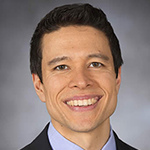 Francis X. Shen, JD, PhD, is an Associate Professor in the Harvard Medical School Center for Bioethics and the MGH Department of Psychiatry. Previously Dr. Shen was a Professor of Law, McKnight Presidential Fellow, and faculty member in the Graduate Program in Neuroscience at the University of Minnesota. He is also a faculty member and past Executive Director of the Center for Law, Brain & Behavior (CLBB) at MGH, and serves as the Executive Director of Education and Outreach for the MacArthur Foundation Research Network on Law and Neuroscience. In fall 2020 he was a Florence Rogatz Visiting Professor of Law at Yale Law School, where he co-taught Criminal Law with Judge (Ret.) Nancy Gertner. He served as a member of the Neuroethics Subgroup of the National Institutes of Health Advisory Committee to the Director BRAIN Initiative Working Group, and speaks nationally and internationally about the emerging intersection of neuroscience and law.
Francis X. Shen, JD, PhD, is an Associate Professor in the Harvard Medical School Center for Bioethics and the MGH Department of Psychiatry. Previously Dr. Shen was a Professor of Law, McKnight Presidential Fellow, and faculty member in the Graduate Program in Neuroscience at the University of Minnesota. He is also a faculty member and past Executive Director of the Center for Law, Brain & Behavior (CLBB) at MGH, and serves as the Executive Director of Education and Outreach for the MacArthur Foundation Research Network on Law and Neuroscience. In fall 2020 he was a Florence Rogatz Visiting Professor of Law at Yale Law School, where he co-taught Criminal Law with Judge (Ret.) Nancy Gertner. He served as a member of the Neuroethics Subgroup of the National Institutes of Health Advisory Committee to the Director BRAIN Initiative Working Group, and speaks nationally and internationally about the emerging intersection of neuroscience and law.
Dr. Shen directs the Shen Neurolaw Lab, whose Lab motto is, “Every story is a brain story.” He conducts empirical and legal research at the intersection of law, ethics, neuroscience, and artificial intelligence. He has co-authored 3 books, including the first Law and Neurosciencecasebook (Aspen), and published articles on a range of neurolaw and neuroethics topics, including the computational phenotyping, portable neuroimaging, memory and lie detection, cognitive enhancement, criminal justice, brain injury, evidentiary admissibility, sports concussion, juror decision-making, criminal mental states, dementia, and mental health. With co-PIs Susan Wolf and Frances Lawrenz at the University of Minnesota and a national working group, Dr. Shen is leading an NIH BRAIN RF1 project on Highly Portable and Cloud-Enabled Neuroimaging Research: Confronting Ethics Challenges in Field Research with New Populations. In 2021, he was awarded the Early Career Scholars Medal by the American Law Institute, one of two medals awarded every other year by the ALI, for being “a pioneer in establishing the interdisciplinary field of law and neuroscience.” He received his B.A. from the University of Chicago, his JD from Harvard Law School, and his PhD from the Harvard Government Department and Harvard Kennedy School Program on Social Policy.


